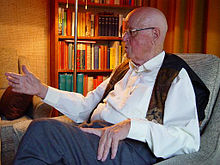Willi Birkelbach
Willi Birkelbach (born January 12, 1913 in Frankfurt am Main ; † July 17, 2008 ibid) was a German SPD politician .
job
After graduating from high school in Frankfurt-Höchst in 1932 , Birkelbach, the son of a factory worker, completed an apprenticeship as a foreign trade clerk and then worked in this profession and as a foreign language correspondent for various companies (including Hochtief AG ). On November 15, 1942, he was drafted into the notorious 999 Penal Battalion and was taken prisoner of war in Albania in 1944 .
In 1946, after returning to Frankfurt, he became chief accountant at Kulzer & Co. , for which he had already worked in 1941/42. In 1947/48 he was head of the trade union school of the DGB Hessen in Oberursel , in 1948 he stayed in the USA for study purposes. From 1953 to 1958 he was a member of the supervisory board of the Mannesmann AG for IG Metall , then to 1978 at the Bochum steelworks (from 1968 as deputy chairman of the supervisory board).
Political party
Birkelbach joined the SPD in 1930 as a 17-year-old. From 1934 he worked illegally for the Socialist Workers' Party of Germany (SAP), a left-wing split from the SPD. In 1938 he was arrested by the Gestapo and sentenced to two and a half years in prison for preparation for high treason.
1954 to 1963 he was district chairman of the SPD Hessen- Süd and from 1954 to 1958 a member of the SPD federal executive committee. In the debates about the Godesberg program , he and Wolfgang Abendroth led a group of left-wing parties with a reform strategy who wanted to significantly modernize the SPD's existing program without, however, abandoning the socialist core. After the failure of their initiative, Birkelbach did not run again for the board elections in 1958.
Nevertheless, he continued to be involved in the SPD, for example, when he was over 90 years old, he was still a speaker in Frankfurt in the 2005 Bundestag election campaign .
MP
Birkelbach was a member of the German Bundestag from its first election in 1949 until its resignation on September 30, 1964. He was also a member of the European Parliament from July 16, 1952 to June 15, 1964 , where he was chairman of the Socialist Group from 1959 to 1964 and also deputy delegate to the Council of Europe from 1950 to 1961 . In December 1961, Birkelbach headed a European Parliament commission that drafted criteria for the admission of new member states; In addition to geographical and economic aspects, this included political aspects such as democracy and the rule of law for the first time. In January 1962, this "Birkelbach Report" was adopted by parliament across all political groups and, just a few months later, served as a key argument for rejecting the first application for membership of Spain, ruled by dictator Francisco Franco .
Public offices
On September 16, 1964, as State Secretary, he became head of the State Chancellery of the State of Hesse (until 1969), where Christel Guillaume, later exposed as a spy, was his office manager. From 1966 to 1976 he was a member of the broadcasting council of the Hessischer Rundfunk . From 1971 to 1975 he was the first data protection officer in the state of Hesse.
Awards
- Wilhelm Leuschner Medal of the State of Hesse (1973)
- Johanna Kirchner Medal (1991)
- Honorary Commander of the Most Excellent Order of the British Empire
- Large Federal Cross of Merit (2001)
- Willy Brandt plaque of the SPD (2005)
Publications
- The big chance. Contributions to the discussion on the topic: Democratic Socialism , Union-Druckerei und Verlags-Anstalt, Frankfurt am Main 1956
- Willi Birkelbach, Conclusion - lived - moved , Schüren-Verlag, Marburg 2000, ISBN 3-89472-172-3 .
literature
- Rudolf Vierhaus , Ludolf Herbst (eds.), Bruno Jahn (collaborators): Biographical manual of the members of the German Bundestag. 1949-2002. Vol. 1: A-M. KG Saur, Munich 2002, ISBN 3-598-23782-0 , pp. 68-69.
Web links
- Literature by and about Willi Birkelbach in the catalog of the German National Library
- personal homepage - Internet Archive
| personal data | |
|---|---|
| SURNAME | Birkelbach, Willi |
| BRIEF DESCRIPTION | German politician (SPD), Member of the Bundestag, MEP |
| DATE OF BIRTH | January 12, 1913 |
| PLACE OF BIRTH | Frankfurt am Main |
| DATE OF DEATH | July 17, 2008 |
| Place of death | Frankfurt am Main |


